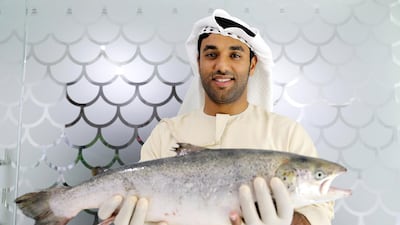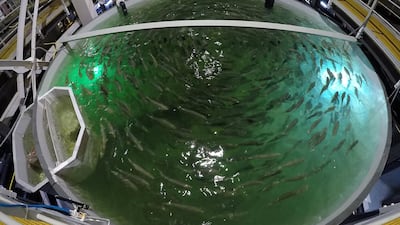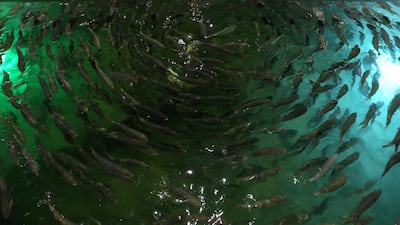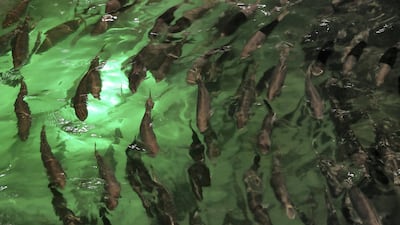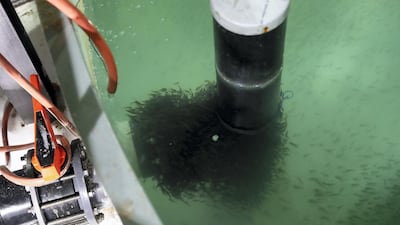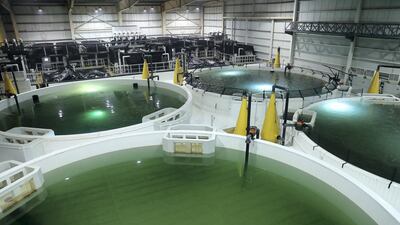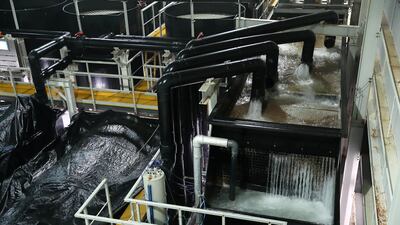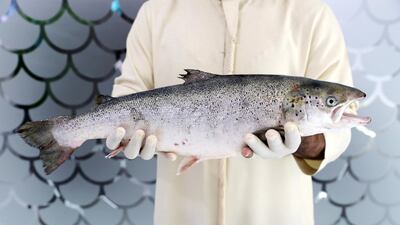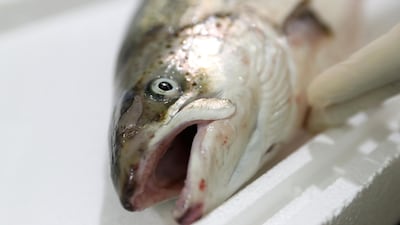With an indoor ski slope, African safari park and one of the world’s biggest aquariums, the UAE has prided itself on big achievements.
Now, one Dubai company has brought the freshwater lakes of Scotland to the country, rearing the UAE’s first ever homegrown Atlantic salmon.
"We've made salmon in the desert, it's pretty remarkable," Bader bin Mubarak, the chief executive of Fish Farm, tells The National at his office in Jebel Ali.
The move echoes the 2011 British comedy film Salmon Fishing in the Yemen, in which fictional character Dr Alfred Jones was hired by a wealthy Yemeni sheikh to introduce salmon into the rivers of his country so he could fish for them.
Eighteen months ago, Fish Farm received 40,000 baby salmon from a natural hatchery in north-west Scotland and thousands more eggs from Iceland, to its onshore hatchery in the UAE.
It plans to sell the first UAE-grown salmon in local restaurants pending deals, and in supermarkets from April 5 after an exclusivity arrangement with Middle East retail chain Spinneys.
From 2020, Fish Farm will sell the first salmon that are 100 per cent born and bred in the UAE, as eggs from the current stock have already hatched and the baby fish are in the process of being grown to market size, which is at least three kilograms.
“This type of land-based salmon farming in a hot climate has never been done in the world before,” says Mr bin Mubarak, who is also chief executive of Dubai Ship Building, a partner at Mubarak Marine and deputy chairman of Dubai Council for Marine and Maritime Industries.
Salmon found only in very cold water such as Scotland, the North Sea, Antarctica, Alaska, Norway and parts of southern Chile.
UAE supermarkets and restaurants import 100 per cent of the salmon they sell, and only about 8 per cent of all the UAE’s fish is caught from local seas.
So Mr bin Mubarak's business has implications for the nation’s long-term food security.
Salmon is the second most eaten fish in the UAE, after hammour, which is found in the Arabian Gulf, raising the need to develop a sustainable source of salmon at home.
“There is huge demand here, and if we lost two of those species, we would have a food security problem,” the chief executive says.
“Add to that any global political issues that may affect imports, and you can see why what we are doing is so important.”
Based on the Spinneys deal and three arrangements with Dubai restaurants set to be struck this month, Fish Farm aims to produce a total of 10,000 to 15,000kg of salmon each month, although this could increase with demand.
The initial amount equates to 300 tonnes in 2019, rising to as much as 1,000 tonnes a year thereafter – a quarter of the 4,000 tonnes of fish the company produces and sells annually, including hammour, bream, bass and shrimp.
Fish Farm has 34 tanks at its facility in Jebel Ali port, of which four are used for salmon rearing.
The tanks, with diameters of 20 metres, are designed to mimic the salmon’s natural lifecycle. The fish are born in shallow, freshwater rivers, then travel towards the coast as they mature, finally jumping into saltwater oceans when they are fully grown.
Fish Farm has invested in the technology and infrastructure to create artificial habitats for the fish to thrive – from the freshwater "river" tank three metres deep, to the six-metre saltwater "ocean".
Automatic transfer pumps connect the tanks, with transparent pipes so the team can monitor how the fish are moving and behaving in transit.
“Here in Jebel Ali we can create whatever country we want, be it Japan, Canada – whatever we need,” Mr bin Mubarak says.
“We control the temperature, tides, salinity and depth, and create sunrise, sunset, automatic currents as if it’s a river or sea, and make it as if we have a storm or calm weather.
"It’s the only salmon breeding system in the world with full environment control.”
Getting the salmon from Scotland to Dubai was the biggest challenge the team faced, says Nigel Lewis, technical director at Fish Farm and a specialist in aquaculture and marine species diversification.
In November 2017, the 40,000 baby salmon, each smaller than a finger, were placed in customised, oxygenated tanks and driven seven hours in a truck from an island near Jura to the nearest airport.
From there, they were flown four hours to a larger airport, then on to Dubai, with the tanks maintaining a cool, 6°C water temperature and consistent oxygen levels throughout the 24-hour journey.
“It took three months to create the tanks, certify everything and get the necessary approvals,” Mr Lewis says.
The team even had to go through dangerous goods training and fit a special hull inside the oxygen cylinders, because you cannot put a live oxygen container in a commercial passenger aircraft.
“It was a major challenge, it really was, but the moment we opened the tanks at the other end, the fish were all jumping and happy," Mr Lewis says. "It was a very successful operation."
He says they did not lose a fish in transit.
UAE homegrown salmon is expected to serve – initially, at least – the premium organic market, as its price is 10 to 15 per cent higher than imported salmon, Mr bin Mubarak says.
The company hopes to reduce the selling price over time as its costs go down. But the higher price also reflects the superior quality of organic salmon, he says.
“People cannot underestimate the benefits of farming," Mr bin Mubarak says. "Our salmon is better quality, healthier, 100 per cent halal.
"We have full trace of what the fish has been fed during its lifetime, which is more than can be said for fresh wild salmon.”
Tom Harvey, commercial manager for meat, fish and poultry at Spinneys Dubai, says: "We are building the partnership with Fish Farm further and bringing something truly fantastic in terms of taste, quality and freshness that also supports local businesses to build a more sustainable food production future for the UAE."
More details of the deal are to be unveiled in the coming weeks. Fish Farm’s next project is to expand its operations by farming red snapper for consumption in the UAE.
It has held early talks with Seychelles officials over plans to set up a hatchery in the Indian Ocean archipelago, rear the fish there then import them to the UAE for sale. A deal is not expected until 2020 or later.
On Monday, Abu Dhabi’s government announced it would spend Dh5.6bn to support research and development in water scarcity and food security as part of the Dh50bn Ghadan 21 economic stimulus package unveiled last year.
Across the UAE, decision makers are placing increased emphasis on the importance of producing food at home to boost the nation’s economic and environmental sustainability.
At Fish Farm, that shift is already well under way.
